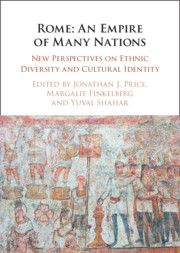Book contents
- Rome: An Empire of Many Nations
- Reviews
- Rome: An Empire of Many Nations
- Copyright page
- Contents
- Figures
- Contributors
- Acknowledgments
- Abbreviations
- Introduction
- Part I Ethnicity and Identity in the Roman Empire
- 1 From Rome to Constantinople
- 2 The Imperial Senate
- 3 Ethnic Types and Stereotypes in Ancient Latin Idioms
- 4 Keti, Son of Maswalat
- Part II Culture and Identity in the Roman Empire
- Part III Ethnicity and Identity in the Roman Empire
- Part IV Iudaea/Palaestina
- Bibliography
- General Index
- Index Locorum
3 - Ethnic Types and Stereotypes in Ancient Latin Idioms
from Part I - Ethnicity and Identity in the Roman Empire
- Rome: An Empire of Many Nations
- Reviews
- Rome: An Empire of Many Nations
- Copyright page
- Contents
- Figures
- Contributors
- Acknowledgments
- Abbreviations
- Introduction
- Part I Ethnicity and Identity in the Roman Empire
- 1 From Rome to Constantinople
- 2 The Imperial Senate
- 3 Ethnic Types and Stereotypes in Ancient Latin Idioms
- 4 Keti, Son of Maswalat
- Part II Culture and Identity in the Roman Empire
- Part III Ethnicity and Identity in the Roman Empire
- Part IV Iudaea/Palaestina
- Bibliography
- General Index
- Index Locorum
Summary
This chapter offers a brief study of mainly Latin ethnic proverbs that apply collective names of ethnic groups and associate them with fixed attributes. By analyzing such proverbial allusions, it shows that the “others” from the point of view of the Romans were located anywhere in the inhabited known world at the time, but there was special interest either in neighbouring and well-known people or in remote groups dwelling at the fringes of the world. The first, closer group, became the focus of mockery and the second, remote group, was so distant and unknown that its members became typed as strange and weird.
- Type
- Chapter
- Information
- Rome: An Empire of Many NationsNew Perspectives on Ethnic Diversity and Cultural Identity, pp. 42 - 57Publisher: Cambridge University PressPrint publication year: 2021
- 1
- Cited by

